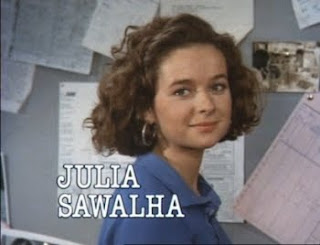When I was 12, things were black and white. A distinct line was drawn between ALL things – you either liked one or the other, and you once you’d made your choice, you stuck to it.
Beano or Dandy. Barbie or Sindy. McDonalds or Burger King. Dr. Fox or Simon Mayo. Children’s BBC or CITV.
The BBC, with ‘Pip’ Schofield and his stupid hand puppet, was for pansies who liked making a rubbish papier mache Tracy Island or watching Michaela Stracken stroke an anteater – but ‘CITV’ had children forced into metal masks on Knightmare, Pat Sharp going mental in a ball pool and of course, Press Gang.
Yes it was on ‘channel three’, yes it had people kissing and saying mild swear words - but to my youthful eyes, Press Gang was a thrilling vision of the future – this is what being a teenager was going to be like.
From the opening titles, with the swing of the typewriter followed by the thumping da da da dum theme tune and Julia Sawalha’s smiling face – I was hooked.
Press Gang had a great premise. Instead of expelling delinquent pupils of Norbridge High, the headmaster forced them to work on the school’s newspaper, the Junior Gazette. To keep them in line, they installed hard-nosed bitch Lynda Day (Sawalha) as the take-no-prisoners editor. A sort of pubescent Maggie Thatcher, the only time you saw Lynda looking happy was in those opening credits – for the rest of the run, she was horrible to pretty much everyone, especially her will-they-won’t-they-on-again-off-again love interest, the rebellious Spike (Dexter Fletcher).
This relationship was the backbone of a series that stands up as the best children’s television series ever made. No, scrap that, I’d go so far as to say that Press Gang is THE best television series ever made FULL STOP.
From 1989 to 1993 millions of school girls lusted over Dexter Fletcher (despite his terrible American accent) while the boys could only dream of being told where to shove their late Norbridge FC match report by Sawalha.
The newsroom also featured the dodgy ad salesman Colin, plum-faced Deputy Editor Kenny and flirty graphics Ed Julie (future Phil Mitchell assassin Lucy Benjamin). Even Suggs and Sadie Frost pop up at one point.
Written by current Doctor Who and Sherlock scribe Steven Moffat, Press Gang never spoke down to its audience. Such was the continuity of the show that you would see minor characters from earlier episodes reappear years later – and be expected to remember them.
Press Gang could be edgy and risqué, but also witty and romantic. It wasn’t just that it tackled youth issues like drug and child abuse – Grange Hill had been doing that for years – it was the way it covered them with humour and poignancy.
When Lynda quits the paper at the end of series one, you were devastated, and when Spike almost dies in a bomb blast a year later and realises Lynda doesn’t love him, you’d be ready to ball your eyes out.
Over the course of five series, a staff member is shot dead, another commits suicide, and in the very last episode, Lynda repents her sins in hell.
And I never saw that happening on the Really Wild Show.


